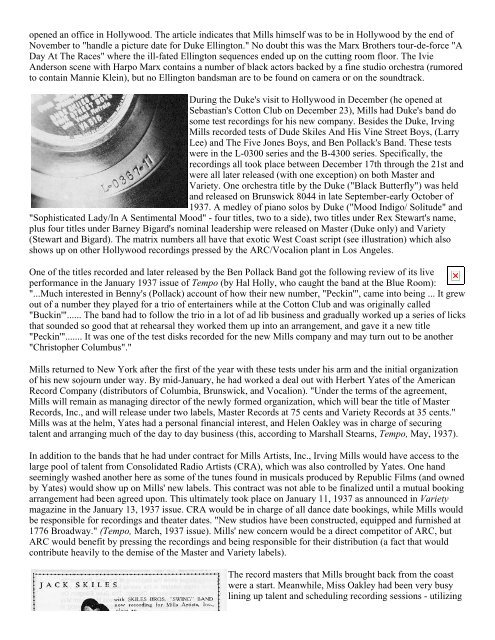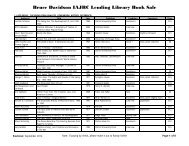the master and variety record labels - the IAJRC
the master and variety record labels - the IAJRC
the master and variety record labels - the IAJRC
Create successful ePaper yourself
Turn your PDF publications into a flip-book with our unique Google optimized e-Paper software.
opened an office in Hollywood. The article indicates that Mills himself was to be in Hollywood by <strong>the</strong> end of<br />
November to "h<strong>and</strong>le a picture date for Duke Ellington." No doubt this was <strong>the</strong> Marx Bro<strong>the</strong>rs tour-de-force "A<br />
Day At The Races" where <strong>the</strong> ill-fated Ellington sequences ended up on <strong>the</strong> cutting room floor. The Ivie<br />
Anderson scene with Harpo Marx contains a number of black actors backed by a fine studio orchestra (rumored<br />
to contain Mannie Klein), but no Ellington b<strong>and</strong>sman are to be found on camera or on <strong>the</strong> soundtrack.<br />
During <strong>the</strong> Duke's visit to Hollywood in December (he opened at<br />
Sebastian's Cotton Club on December 23), Mills had Duke's b<strong>and</strong> do<br />
some test <strong>record</strong>ings for his new company. Besides <strong>the</strong> Duke, Irving<br />
Mills <strong>record</strong>ed tests of Dude Skiles And His Vine Street Boys, (Larry<br />
Lee) <strong>and</strong> The Five Jones Boys, <strong>and</strong> Ben Pollack's B<strong>and</strong>. These tests<br />
were in <strong>the</strong> L-0300 series <strong>and</strong> <strong>the</strong> B-4300 series. Specifically, <strong>the</strong><br />
<strong>record</strong>ings all took place between December 17th through <strong>the</strong> 21st <strong>and</strong><br />
were all later released (with one exception) on both Master <strong>and</strong><br />
Variety. One orchestra title by <strong>the</strong> Duke ("Black Butterfly") was held<br />
<strong>and</strong> released on Brunswick 8044 in late September-early October of<br />
1937. A medley of piano solos by Duke ("Mood Indigo/ Solitude" <strong>and</strong><br />
"Sophisticated Lady/In A Sentimental Mood" - four titles, two to a side), two titles under Rex Stewart's name,<br />
plus four titles under Barney Bigard's nominal leadership were released on Master (Duke only) <strong>and</strong> Variety<br />
(Stewart <strong>and</strong> Bigard). The matrix numbers all have that exotic West Coast script (see illustration) which also<br />
shows up on o<strong>the</strong>r Hollywood <strong>record</strong>ings pressed by <strong>the</strong> ARC/Vocalion plant in Los Angeles.<br />
One of <strong>the</strong> titles <strong>record</strong>ed <strong>and</strong> later released by <strong>the</strong> Ben Pollack B<strong>and</strong> got <strong>the</strong> following review of its live<br />
performance in <strong>the</strong> January 1937 issue of Tempo (by Hal Holly, who caught <strong>the</strong> b<strong>and</strong> at <strong>the</strong> Blue Room):<br />
"...Much interested in Benny's (Pollack) account of how <strong>the</strong>ir new number, "Peckin'", came into being ... It grew<br />
out of a number <strong>the</strong>y played for a trio of entertainers while at <strong>the</strong> Cotton Club <strong>and</strong> was originally called<br />
"Buckin'"...... The b<strong>and</strong> had to follow <strong>the</strong> trio in a lot of ad lib business <strong>and</strong> gradually worked up a series of licks<br />
that sounded so good that at rehearsal <strong>the</strong>y worked <strong>the</strong>m up into an arrangement, <strong>and</strong> gave it a new title<br />
"Peckin'"....... It was one of <strong>the</strong> test disks <strong>record</strong>ed for <strong>the</strong> new Mills company <strong>and</strong> may turn out to be ano<strong>the</strong>r<br />
"Christopher Columbus"."<br />
Mills returned to New York after <strong>the</strong> first of <strong>the</strong> year with <strong>the</strong>se tests under his arm <strong>and</strong> <strong>the</strong> initial organization<br />
of his new sojourn under way. By mid-January, he had worked a deal out with Herbert Yates of <strong>the</strong> American<br />
Record Company (distributors of Columbia, Brunswick, <strong>and</strong> Vocalion). "Under <strong>the</strong> terms of <strong>the</strong> agreement,<br />
Mills will remain as managing director of <strong>the</strong> newly formed organization, which will bear <strong>the</strong> title of Master<br />
Records, Inc., <strong>and</strong> will release under two <strong>labels</strong>, Master Records at 75 cents <strong>and</strong> Variety Records at 35 cents."<br />
Mills was at <strong>the</strong> helm, Yates had a personal financial interest, <strong>and</strong> Helen Oakley was in charge of securing<br />
talent <strong>and</strong> arranging much of <strong>the</strong> day to day business (this, according to Marshall Stearns, Tempo, May, 1937).<br />
In addition to <strong>the</strong> b<strong>and</strong>s that he had under contract for Mills Artists, Inc., Irving Mills would have access to <strong>the</strong><br />
large pool of talent from Consolidated Radio Artists (CRA), which was also controlled by Yates. One h<strong>and</strong><br />
seemingly washed ano<strong>the</strong>r here as some of <strong>the</strong> tunes found in musicals produced by Republic Films (<strong>and</strong> owned<br />
by Yates) would show up on Mills' new <strong>labels</strong>. This contract was not able to be finalized until a mutual booking<br />
arrangement had been agreed upon. This ultimately took place on January 11, 1937 as announced in Variety<br />
magazine in <strong>the</strong> January 13, 1937 issue. CRA would be in charge of all dance date bookings, while Mills would<br />
be responsible for <strong>record</strong>ings <strong>and</strong> <strong>the</strong>ater dates. "New studios have been constructed, equipped <strong>and</strong> furnished at<br />
1776 Broadway." (Tempo, March, 1937 issue). Mills' new concern would be a direct competitor of ARC, but<br />
ARC would benefit by pressing <strong>the</strong> <strong>record</strong>ings <strong>and</strong> being responsible for <strong>the</strong>ir distribution (a fact that would<br />
contribute heavily to <strong>the</strong> demise of <strong>the</strong> Master <strong>and</strong> Variety <strong>labels</strong>).<br />
The <strong>record</strong> <strong>master</strong>s that Mills brought back from <strong>the</strong> coast<br />
were a start. Meanwhile, Miss Oakley had been very busy<br />
lining up talent <strong>and</strong> scheduling <strong>record</strong>ing sessions - utilizing




